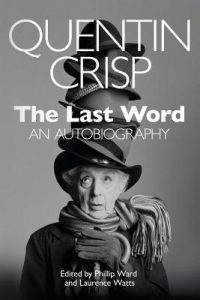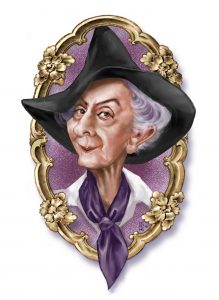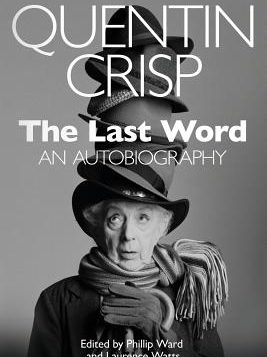 The Last Word: An Autobiography
The Last Word: An Autobiography
by Quentin Crisp
Edited by Phillip Ward
MB Books LLC. 232 pages, $14.99
I SEEM TO RECALL The New York Times referring to The King’s Speech as “a pudding of a movie,” meaning, I assume, that it was an enjoyable but not a very nutritious film. The same metaphor could be applied to Quentin Crisp’s final memoir, The Last Word, which offers lots of palate-pleasing soupçons of wit but not much of substance. At turns flighty and bitchy, the book is mostly a series of observations and impulses related with “humble brag” self-deprecation. This is too bad, especially for those of us who remember Crisp’s iconic memoir The Naked Civil Servant, which was the source of an excellent biopic of the same name.
The Last Word does promise something significant, but it doesn’t deliver. Crisp begins the book with the captivating revelation that he is not in fact gay, but transgender, that his life conflicts have truly centered on gender identity rather than sexual orientation. What an important—and capstone—work this could have been if he’d reflected on his own history through this new lens. Such a focus would have made the book something far more than the confection it is. But Crisp (who died in 1999) drops the subject quickly. The rest of the pages are filled with offhand observations (“Most English people do not want to be happy”) and bitchy asides (Joan Collins has “looked the same way for fifty years”). To be fair, he was ninety years old when he wrote this book, and in failing health.
 We learn of his likes and dislikes, which are often contrarian in nature. He explains what he eats and drinks and how he washes himself. Including such daily life minutiae has to be seen in light of Crisp’s assertion in his opening paragraph that “I am nobody and I am nothing.” He lived simply, occupying one room in London and then New York. And there is another unfulfilled promise in the book: the move—late in life—from his native country to New York’s gritty Lower East Side. He doesn’t examine in any depth why he had to leave England at the age of 72, sticking to easy generalizations about the two cultures.
We learn of his likes and dislikes, which are often contrarian in nature. He explains what he eats and drinks and how he washes himself. Including such daily life minutiae has to be seen in light of Crisp’s assertion in his opening paragraph that “I am nobody and I am nothing.” He lived simply, occupying one room in London and then New York. And there is another unfulfilled promise in the book: the move—late in life—from his native country to New York’s gritty Lower East Side. He doesn’t examine in any depth why he had to leave England at the age of 72, sticking to easy generalizations about the two cultures.
He also muddles the significance of one of the last controversies of his life, when he said publically that a woman should be able to abort a fetus if she knew the resultant human would be gay. Instead of taking the opportunity to recant this bit of foolishness, he revives the polemic and reiterates his original defense: His suffering as a homosexual was so awful that he wouldn’t wish it on any newborn. But that isn’t logical, as the repressive world in which he grew up was hardly the one that prevailed in either London or New York twenty years ago. And he never calls back the transgender issue. He easily could have recast the discussion in terms of his new- found identity. Is it not possible or likely that his youthful suffering had more to do with his gender identity than with his sexual orientation? By that point, however, he seems to have forgotten that he introduced the issue of gender identity at all.
While I was hoping for a bit more substance and continuity, I nonetheless found The Last Word to be smoothly written. It was fun to observe someone with a vast catalogue of life experiences and the ability to turn them into witticisms. Reading this book, one can readily understand why Quentin Crisp was such a sought-after dinner guest. Certainly he was a gifted talker. What remains unknowable from this final memoir is if anyone ever challenged him at these parties, and if he was able to answer such challenges meaningfully.
Peter Marino, an English professor emeritus at SUNY Adirondack, is the author of the YA novel Magic and Misery.






